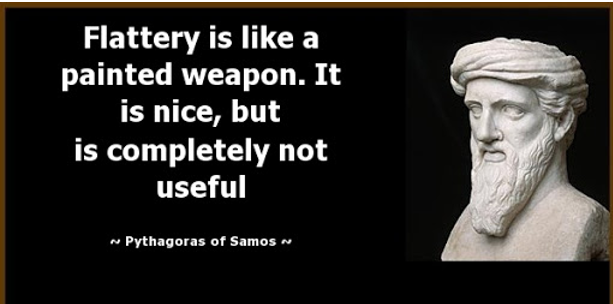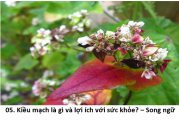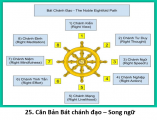Creating happiness
Tạo Dựng Hạnh Phúc
English: Ajahn Brahm
Việt ngữ: Chơn Quán Trần-ngọc Lợi
Compile: Lotus group
37. Tạo Dựng Hạnh Phúc – Creating happiness - Song ngữ

Chương 5: Tạo Dựng Hạnh Phúc – Creating happiness - Song ngữ
36. Flattery gets you everywhere - Tâng Bốc Đưa Con người Ta Đi Xa Lắm!

Tâng bốc cũng giống như vũ khí được tô vẽ - Nó rất hay, nhưng hoàn toàn không hữu ích.
We all like to hear ourselves praised but unfortunately most of the time we only hear about our faults. That’s fair, I suppose, because most of the time we only speak about someone else’s faults. We hardly ever speak praise. Try listening to yourself speaking.
Tất cả chúng ta đều muốn được khen nhưng thường hay bị chê. Tôi nghĩ như vậy cũng hợp lý thôi, vì chúng ta hay chê hơn khen người khác. Bạn hãy nghe những lời do chính miệng mình thốt ra thì sẽ biết liền.
Without praise, without positive reinforcement of good qualities, those qualities wither and die. But a little bit of praise is a grandstand of encouragement. We all want to hear ourselves praised; we just want to be sure about what we have to do to hear it.
Không được khen, các sự việc tốt lành sẽ bị lãng quên và mất đi, lời khen, dầu chỉ là một lời, có huyền lực gìn giữ và phát huy chúng. Chúng ta thích nghe lời khen và làm đủ mọi cách để được tâng bốc.
I once read in a magazine about a therapy group that used positive reinforcement for young children who had a rare eating disorder. Whenever these children ate solid food, they would vomit it up almost immediately. When any child managed to keep a morsel of food down for a minute or more, the group would throw a party. The parents would put on paper hats and stand on the chairs shouting and clapping; the nurses would dance and throw colored streamers; someone would play the children’s favorite music. There was suddenly a huge celebration, with the child who had kept their food down at the center of it all.
Lần nọ, tôi đọc tài liệu nói về phương pháp chữa chứng ít thèm ăn của trẻ con bằng sự tâng bốc. Các bé này ói mửa ngay sau khi nuốt thức ăn cứng khỏi miệng. để cỗ vũ các em nhóm phụ huynh ăn mừng mỗi khi có em nào giữ được thức ăn cứng trong bao tử hơn một phút. Phụ huynh các em đội nón giấy, leo lên ghế đứng ca hát và vỗ tay. Y tá nhảy múa và tung bông giấy màu. Vài người còn chơi nhạc mà em thích. Em được lưu ý đặc biệt trong nhóm các em đồng thuyền và trở thành diễn viên chánh của buổi hội vui.
The children began to keep their food down longer and longer. The sheer delight at being the cause of such happiness rewired their nervous systems. Those children wanted praise that much. So, do we.
Lần lần các em được khen đó giữ được thức ăn trong bao tử lâu hơn. Sự thích thú được biết mình là đầu dây mối nhợ của buổi liên hoan tác dụng đến hệ thần kinh của các em, những đứa bé ham được tâng bốc như người lớn chúng ta.
Whoever said ‘flattery gets one nowhere’ was a ... but I guess we should forgive them. Flattery, my friend, gets one everywhere!
Ai bảo rằng “sự tâng bốc chẳng giúp được ai” là người... nhưng tôi thiết nghĩ chúng ta nên tha thứ họ. Sự tâng bốc đưa con người đi xa lắm các bạn à!
37. How to be a VIP? - Làm thế nào để trở thành VIP?
In the first year of our monastery, I had to learn how to build. The first major structure was a six-toilet and six-shower ablution block, so I had to learn all about plumbing. In order to learn, I took the plans to a plumbing shop, laid the plans on the counter, and said, ‘Help!’
Trong năm đầu tiên tự viện được thành lập tôi phải học xây dựng. công tác đầu tiên của tôi là xây khu gồm sáu nhà vệ sinh và sáu phòng dùng để rửa đồ thờ tự sau mỗi buổi lễ. Thế là tôi phải học bắt ống nước. Tôi học bằng cách đem bản vẽ đến tiệm ống nước và xin nhờ “chỉ dẫn”.
It was quite a large order, so the man at the counter, Fred, didn’t mind spending a little extra time explaining what parts were needed, why they were needed, and how to glue it all together. Eventually, with a lot of patience, common sense, and advice from Fred, the waste-water plumbing was all finished. Our local council’s health inspector came, gave it astringent testing, and it passed. I was thrilled.
Công tác khá lớn nên Fred, anh chàng đứng ở quầy tiếp khách, không ngần ngại dành cho nhiều thì giờ chỉ dẫn chi li, kể cả việc phải bôi keo như thế nào cho đúng kỷ thuật. Nhờ sẵn tánh nhẫn nại và được sự giúp đỡ tận tình của Fred tôi gắn xong hệ thống nước thải. Vị thanh tra của ủy ban y tế đến khám - ông khám rất kỹ - gật đầu cho qua. Tôi rất đỗi vui sướng.
A few days later, the bill arrived for the plumbing parts. I asked for a cheque from our treasurer and sent it off with a letter of thanks, especially to Fred for helping us start our monastery.
Vài ngày sau tôi gởi tiền cho tiệm ống nước kèm theo thư cám ơn, đặc biệt cám ơn Fred đã giúp tự viện có phương tiện thiết yếu để hoạt động.
I did not realize at the time that such a big plumbing firm, with many branches around Perth, had a separate accounts department. My letter was opened and read by a clerk in that section, who was so stunned at receiving a letter of praise that they took it immediately to the manager of accounts. Usually, when accounts receive a letter along with a cheque, it is a complaint. The head of the accounts department was also taken aback, and took my letter straight to the managing director of the whole company. The MD read the letter and was so pleased that he picked up the phone on his desk, rang Fred at the sales counter of one of their many branches, and told him about my letter on his mahogany desk.
Tôi không ngờ tiệm “của Fred” chỉ là một cơ sở thương mại của một công ty lớn có cả một phân bộ thanh toán riêng nên chi phiếu và thư tôi đi thẳng đến cô thư ký kế toán thay vì đến tay Fred. Được thư tôi cô thư ký mở xem và ngạc nhiên, vì thông thường thư đi kèm với giấy trả tiền chỉ là thư khiếu nại. Cô đem thư lên vị kế toán trưởng. Ông cũng ngạc nhiên nên trình giám đốc điều hành công ty. Đọc thơ xong ông giám đốc giở điện thoại gọi Fred liền cho biết anh có thư khen đang nằm trên bàn giấy của ông. Ông nói:
‘This is just the sort of thing we are looking for in our company, Fred. Customer relations! That’s the way ahead.’
‘Yes, Sir.’
‘You’ve done an excellent job, Fred.’
‘Yes, Sir.’
‘I wish we had more employees like you.’
‘Yes, Sir.’
‘What salary are you on? Perhaps we can do better?’
‘YES, SIR!’
‘Well done, Fred!’
‘Thank you, Sir.’
“Đây là thư mà công ty mong đợi. Giao tiếp khách hàng. Phải như vậy đó!”
“Dạ. Thưa ông”
“Fred, anh đã giúp tạo uy tín cho công ty”
“Dạ”
“Công ty chắc chắn sẽ khen thưởng anh. Tôi sẽ gặp anh trong nay mai.”
“Dạ, cám ơn ông.”
“Rất tốt, Fred!”
“Dạ, cám ơn ông.”
As it happened, I went into the plumbing shop an hour or two later to change a part for another job. There were two big Aussie plumbers, with shoulders as wide as septic tanks, waiting for service ahead of me. But Fred saw me. ‘BRAHM!’ he said with a big smile, ‘Come here.’
Một hai tiếng đồng hồ sau đó tôi ra tiệm “của Fred” để đổi vài món đồ. Tôi thấy hai ông thợ ống nước người Úc thịt bắp vai u xếp hàng trước tôi. Fred bên trong thấy tôi bèn gọi với nụ cười nở rộng trên môi.
“Sư BRAHM, tới đây”
I was given VIP treatment. I was taken around the back, where customers were not supposed to go, to choose the replacement part that I needed. Fred’s mate at the counter told me about the recent phone call from the managing director.
I found the part that I needed. It was bigger and much more expensive than the part I was giving back. ‘How much do we owe you?’ I asked. ‘What’s the difference?’
With a smile from ear to ear, Fred replied, ‘Brahm, for you, there’s no difference!’
So, praise makes good financial sense as well.
Tôi được Fred đón mời như VIP. Tôi được đi vô trong quày, chỗ mà khách không được phép vô, để chọn món đồ tôi cần thay thế. Tôi tìm ra món đồ tôi cần. Nó lớn hơn và chắc là phải đắt hơn món tôi đổi, tôi hỏi Fred:
“Tôi cần bù bao nhiêu, hở Fred?”
“Đối với sư Brahm, khỏi thêm gì cả!” Anh đáp với nụ cười nở rộng. Và anh kể cho tôi nghe trọn câu chuyện điện thoại giữa anh và ông giám đốc của anh.
Lời khen cũng đáng đồng tiền đó chứ!
38. The two-finger smile - Cười Bằng Hai Ngón Tay

Man marking his smile with 2 fingers
Praise saves us money, enriches our relationships and creates happiness. We need to spread more of it around.
Lời khen đáng đồng tiền, thắt chặt tình giao hảo và tạo niềm vui hạnh phúc. Chúng ta cần phổ biến rộng rãi khời khen.
The hardest person to give any praise to is ourself. I was brought up to believe that someone who praises themselves becomes big-headed. That’s not so. They become big-hearted. Praising our good qualities to ourselves is positively encouraging them.
Người mà chúng ta khó khen nhất là chính chúng ta. Tôi lớn lên trong truyền thống tin tưởng rằng ai tự khen là người tự cao tự đại. Thật ra không phải vậy đâu. Họ hào hiệp, rộng lượng thì đúng hơn. Khen các đức tánh của mình là tích cực khuyến khích chúng đó chớ.
When I was a student, my first meditation teacher gave me some practical advice. He began by asking me the first thing I did after getting up in the morning.
‘I go to the bathroom,’ I said.
‘Is there a mirror in your bathroom?’ he enquired.
‘Of course.’
‘Good,’ he said. ‘Now, every morning, even before you brush your teeth, I want you to look in that mirror and smile at yourself.’
Hồi còn là sinh viên theo học lớp thiền, tôi được thầy cho một lời khuyên rất thực tế. Ông hỏi tôi làm gì trước tiên sau khi sáng thức dậy.
“Dạ, làm vệ sinh” tôi đáp.
“Trong phòng vệ sinh có kiếng soi mặt không?”
“Dạ có.”
“Tốt,” ông nói, “Vậy chú hãy nhìn vô kiếng cười trước khi đánh răng. Tôi muốn chú cười với chú trong kiếng.”
‘Sir!’ I began to protest. ‘I am a student. Sometimes I go to bed very late, and get up in the morning not feeling my best. Some mornings, I would be frightened to look at myself in a mirror, let alone smile!’
“Dạ cười gì nổi mà cười, thưa thầy,” tôi chống chế, “sinh viên tụi con thường ngủ trễ, sáng dậy ít khi tỉnh táo, thấy mặt là phát sợ rồi.”
He chuckled, looked me in the eye and said, ‘If you cannot manage a natural smile, then take your two index fingers, place one on each corner of your mouth, and push up. Like this.’ And he showed me.
He looked ridiculous. I giggled. He ordered me to try it. So, I did.
Ông khẽ cười, nhìn thẳng vô mắt tôi và bảo: “Nếu cậu không thể cười tự nhiên thì dùng hai ngón tay trỏ kéo chằng miệng ra mà cười.” Ông làm thử và nói, “Như vầy nè.”
Ông trông rất dị hợm. Tôi bật cười khúc khích. Ông biểu tôi làm thử. Tôi làm cho ông coi.
The very next morning, I dragged myself out of bed and staggered to the bathroom. I looked at myself in the mirror. ‘Urrgh!’ It was not a pretty sight. A natural smile wasn’t a goer. So, I got out my two index fingers, placed one on each corner of my mouth and pushed up. I then saw this stupid young student making a silly face in the mirror, and I couldn’t help grinning. Once there was a natural smile, I saw the student in the mirror smiling at me. So, I smiled even more. The man in the mirror smiled even more. In a few seconds, we ended up laughing at each other.
Ngay sáng hôm sau, tôi lê thân ra khỏi giường, đi băng xiêng băng nai vô phòng tắm. Tôi nhìn lên kiếng “Rrrrr!” Dễ sợ. Không sao tôi mở miệng cười được. Tôi nghe lời thầy lấy tay kéo chằng miệng ra. Tôi thấy thằng ngốc trong kiếng và không sao nín cười được. Thằng ngốc cười lại tôi. Tôi cười lớn hơn. Nó cũng cười lớn hơn. Sau cùng hai đứa cùng cười với nhau.
I continued that practice every morning for two years. Every morning, no matter how I felt when I got out of bed, I was soon laughing at myself in the mirror, usually with the help of my two fingers. People say I smile a lot these days.
Perhaps the muscles around my mouth got kind of stuck in that position.
Tôi thực tập cười như vậy trong vòng hai năm. Mỗi sáng, sau khi thức dậy, làm gì thì làm, tôi đều cười với tôi trong kiếng bằng hai ngón tay trỏ của tôi. Hiện tôi có tiếng là người hay cười. Phải chăng các cơ quanh miệng của tôi đã quen với cái cười rồi.
We can try the two-finger trick any time of the day. It is especially useful when we feel sick, fed up or down right depressed. Laughter has been proved to release endorphins into our bloodstream, which strengthens our immune system and make us feel happy.
Tôi có thể thử cái trò cười bằng hai ngón tay này bất cứ lúc nào. Nó giúp tôi rất nhiều, nhất là trong lúc bệnh, buồn bực, chán nản hay trầm cảm. Cười giúp thảy vô máu chất endorphin có khả năng củng cố hệ thống miễn nhiễm và làm con người hưng phấn.
It helps us see the 998 good bricks in our wall, not only the two bad bricks. And laughter makes us look beautiful. That’s why I sometimes call our Perth Buddhist temple ‘Ajahn Brahm’s Beauty Salon’.
Cười giúp chúng ta thấy 998 viên gạch tốt (xem “Hai viên gạch lệch”, số 1). Cười làm đẹp chúng ta. Vì vậy, tôi thỉnh thoảng gọi tự viện Perth là “Viện thẩm mỹ của Ajahn Brahm”
39. Priceless teachings - Lời Giảng Vô giá
I was told that depression has spawned a multi-billion-dollar industry. That is really depressing! It doesn’t seem right to grow rich from other people’s suffering. In our austere tradition, the monks are not allowed to have money, and we never charge for the talks we give, for counselling, or for any other services.
Tôi nghe nói trầm cảm đang nuôi sống một ngành kinh doanh siêu lợi nhuận - cả tỷ đô la hằng năm. Làm giàu trên sự khổ đau của người khác, thật đáng buồn! Truyền thống của tông chúng tôi không tính tiền cho bất cứ dịch vụ nào: thuyết giảng, ấn tống, cố vấn, khuyên lơn v.v...
An American woman rang up a fellow monk, a renowned teacher of meditation, to enquire about learning how to meditate.
‘I hear you teach meditation,’ she drawled over the phone.
‘Yes, madam, I do,’ he politely replied.
‘How much do you charge?’ she asked, getting to the point.
‘Nothing, madam.’
‘Then you can’t be any good!’ she replied, and she hung up the phone.
Hôm nọ có một bà người Mỹ điện thoại đến vị thiền sư nổi tiếng để xin học thiền. Bà lè nhè nói:
“Tôi có nghe nói sư dạy thiền…”
“Thưa bà có,” ông từ tốn đáp.
“Sư lấy bao nhiêu vậy?” Bà vào đề ngay.
“Không tốn tiền thưa bà.”
“Vậy chắc sư không khá!” Bà nói rồi gác ống.
I received a similar phone call a few years ago from a Polish–Australian woman:
‘Is there a talk at your center this evening?’ she enquired.
‘Yes, madam. It starts at 8.00 p.m.,’ I told her.
‘How much do you have to pay?’ she asked.
‘Nothing, madam, it’s free,’ I explained. Then there was a pause.
‘You haven’t understood me,’ she said forcefully.
‘How much money do I have to give you to listen to the talk?’
‘Madam, you don’t have to give any money, it’s free,’ I said, as soothingly as I could.
Tôi cũng nhận được một cú điện thoại tương tự từ một bà người Úc gốc Ba Lan hồi mấy năm trước:
“Nghe nói trung tâm sư có buổi nói chuyện vào tối nay?”
“Thưa bà đúng. Vào lúc 8:00 giờ tối,” tôi đáp
“Vé vô cửa là bao nhiêu, thưa sư?”
“Thưa vô cửa tự do,” tôi giải thích.
Một giây im lặng. đoạn tôi nghe bà gằng giọng:
“Sư không hiểu ý tôi. Tôi muốn hỏi tôi phải cúng bao nhiêu để được nghe sư thuyết pháp?”
“Thưa bà không cần cúng dường món tiền nào hết. Vào cửa tự do,” tôi cố ôn tồn.
‘Listen!’ she shouted at me down the line. ‘Dollars! Cents! How much must I cough up to get in?’
‘Madam, you don’t have to cough up anything. You just walk in. Sit at the back, and leave whenever you like. No one will ask you for your name or address, you won’t be handed any leaflets, and you won’t be asked for any donation at the door. It’s completely free.’
There was a long pause now.
“Nghe này!” Bà ta la lớn bên kia đầu dây, “Tiền đô la! Tiền cắc! Tôi phải móc ra bao nhiêu để trả tiền vô cửa?”
“Thưa bà không phải xuất đồng nào hết. Bà chỉ đến và cứ đi vô. Ngồi. Và ra đi lúc nào cũng được hết. Không ai có quyền hỏi quý danh hay địa chỉ của bà. Không ai được quyền quảng cáo bất cứ thứ gì. Cũng không ai yêu cầu bà cúng dường lúc bà vô hay ra cửa. hoàn toàn miễn phí.”
Im lặng và im lặng lâu hơn.
Then she asked, sincerely wanting to know, ‘Well, what do you guys get out of this then?’
‘Happiness, madam,’ I answered. ‘Happiness.’
These days, when anyone asks how much these teachings cost, I never say they are free. I say they are priceless.
Sau cùng bà hỏi gặng, thành thật muốn biết rõ hơn:
“Vậy thì các sư được gì khi thuyết pháp?”
“Hoan hỉ, thưa bà,” tôi đáp. “Hạnh phúc!”
Giờ đây khi có ai đó hỏi tới các buổi pháp thoại, tôi không trả lời: “Vào cửa tự do” nữa mà là “Vô giá”
40. This too will pass - Rồi cũng sẽ qua

This too will pass - Rồi cũng sẽ qua
One of the most priceless of teachings that helps with depression, is also one of the simplest. But teachings that seem simple are easy to misunderstand. Only when we are finally free from depression can we claim to have truly understood the following story.
Với người bị chứng trầm cảm lời nói phải cần đơn giản mới mong có kết quả. Nhưng lời đơn giản hay bị hiểu lầm. Chỉ những người không bị trầm cảm hành hạ mới hiểu hoàn toàn câu chuyện sau.
The new prisoner was afraid and very depressed. The stone walls of his cell soaked up any warmth; the hard iron bars sneered at all compassion; the jarring collision of steel, as many gates closed, locked hope beyond reach. His heart sank as low as his sentence stretched long. On the wall, by the head of his cot, he saw scratched in the stone the following words: THIS TOO WILL PASS.
Có một tù nhân rất lo sợ bị trầm cảm nặng. Tường đá của nhà tù hút hết hơi ấm; song sắt to chế giễu mọi lòng từ; tiếng đóng ập chói tai của cửa khám làm tiêu tan mọi hy vọng của ông. Tim ông chùng xuống tận đáy sâu vì bản án quá dài. Một hôm ông nhìn lên tường thấy nơi chỗ đầu nằm mấy chữ quọt quẹt trên đá như sau: “Rồi cũng sẽ qua”
These words pulled him through, as they must have supported the prisoner before him. No matter how hard it got, he would look at the inscription and remember, ‘This too will pass.’ On the day he was released, he knew the truth of those words. His time was completed; jail too had passed.
Bốn chữ này giúp ông đi qua - chắc chúng cũng đã giúp được nhiều tù nhân trong xà lim này trước đây rồi. Từ dạo ấy, dầu có khốn khổ thế nào ông cũng nhớ “Rồi cũng sẽ qua”. Ngày ông được thả, ông hiểu rất rõ ý nghĩa của bốn chữ đó.
As he regained his life, he often thought about that message, writing it on bits of paper to leave by his bedside, in his car and at work. Even when times were bad, he never got depressed. He simply remembered, ‘This too will pass’, and struggled on through. The bad times never seemed to last all that long. Then when good times came, he enjoyed them, but never too carelessly. Again, he remembered, ‘This too will pass’, and so carried on working at his life, taking nothing for granted. The good times always seemed to last uncommonly long.
Even when he got cancer, ‘This too will pass’ gave him hope. Hope gave him strength and the positive attitude that beat the disease. One day the specialist confirmed that ‘the cancer too had passed’.
Trở vào đời ông thường nghĩ tới thông điệp viết vội trên vách đá nhà tù. Ông viết lại trên nhiều miếng giấy nhỏ để giữ bên gối, trong xe, chỗ làm. Và ông không bao giờ bị trầm cảm nữa dầu tình huống có thê thảm đến mấy. “Rồi cũng sẽ qua” luôn luôn nhắc nhở ông phấn đấu và rằng các khó khăn không bao giờ kéo dài vô tận. Lúc gặp vận may ông tận hưởng nhưng cẩn trọng. Hình như cái tốt đến và lưu lại với ông dài lâu hơn vì lúc nào ông cũng tâm niệm rằng cái xấu rồi cũng sẽ qua. Thậm chí lúc bị ung thư “Rồi cũng sẽ qua” đã đem lại cho ông thêm sức lực và niềm lạc quan, hai tiên dược ấy đẩy lùi ung thư. Thật vậy, hôm ông đi tái khám bác sĩ bảo ung thư của ông đã “đi qua”
At the end of his days, on his death bed, he whispered to his loved ones, ‘This too will pass,’ and settled easily into death. His words were his last gift of love to his family and friends. They learned from him that ‘grief too will pass’. (5) Depression is a prison that many of us pass through.
Ngày hôm lâm chung, nằm trên giường bệnh ông thì thầm với thân nhân “Rồi cũng sẽ qua” và nhắm mắt lìa đời, an tịnh. Lời trối trăng của ông là món quà tình thương sau cùng ông gởi lại cho gia đình và bạn bè. Họ học được bài học quý “Rồi sầu muộn cũng sẽ qua”.
(Tôi nghe được câu chuyện xưa này lần đầu tiên lúc còn là một Phật tử trẻ ở Anh Quốc. Chuyện được kể lại và trích đăng trong The Way of the Sufi, Penguin Books, Harmandsworth, 1975, trang 80 – 1)
‘This too will pass’ helps us pull through. It also avoids one of the great causes of depression, which is taking the happy times too much for granted.
Trầm cảm là nhà tù mà ai ai trong chúng ta cũng đều có lần trải qua. “Rồi cũng sẽ qua” giúp chúng ta thoát ra an toàn. Thông điệp này còn giúp chúng ta tránh một trong những nguyên nhân lớn gây trầm cảm: xem hạnh phúc là điều dĩ nhiên.
41. The heroic sacrifice - Hy Sinh Quả Cảm
When I was a schoolteacher, my attention was drawn to the student in my class of thirty who came bottom in the end-of-year exams. I could see that he was depressed as a result of his performance, so I took him aside.
Lúc đi dạy tôi để ý một em bé “đội sổ” đứng thứ ba mươi trong lớp có ba mươi học sinh -trong kỳ thi cuối năm. Biết em thất vọng vì học lực kém cỏi của mình tôi kéo em ra riêng và khuyên giải:
I said to him: ‘Someone has to come thirtieth in a class of thirty. This year, it happens to be you who has made the heroic sacrifice, so that none of your friends have to suffer the ignominy of being bottom of the class. You are so kind, so compassionate. You deserve a medal.’
“Phải có một em đứng hàng thứ ba mươi trong lớp ba mươi học sinh. Năm nay em quả cảm hy sinh nên không có em nào khác chịu cái nhục “đội sổ”. Em rất tốt, có lòng trắc ẩn. Em đáng được huy chương!”
We both knew that what I was saying was ridiculous, but he grinned. He didn’t take it as such an end-of-the-world event any more.
He did much better the next year, when it was someone else’s turn to make the heroic sacrifice.
Hai chúng tôi hiểu rằng điều đó nói rất lố bịch, nhưng em cười toe toét. Em không xem đó là chuyện-tận-cùng của thế giới nữa.
Năm sau em học khá nhiều hơn và môt em khác thay phiên làm việc hy sinh quả cảm: “đội sổ”.
42 - A truck-load of dung - Xe Phân Trước nhà

Who Ordered This Truckload of Dung?
Unpleasant things, like coming bottom of our class, happen in life. They happen to everyone. The only difference between a happy person and one who gets depressed is how they respond to disasters.
Chuyện không vui như “đội sổ” xảy ra thường xuyên trên đời và có thể xảy ra cho bất cứ ai. Chỉ có một sự khác biệt, đó là khác biệt giữa người không buồn và người buồn khi đối đầu với bất hạnh.
Imagine you have just had a wonderful afternoon at the beach with a friend. When you return home, you find a huge truck-load of dung has been dumped right in front of your door. There are three things to know about this truck-load of dung:
- You did not order it. It’s not your fault.
- You’re stuck with it. No one saw who dumped it, so you cannot call anyone to take it away.
- It is filthy and offensive, and its stench fills your whole house. It is almost impossible to endure.
Thử nghĩ: Bạn vừa vui với cô bạn trên bãi biển một chiều hè. Lúc về nhà bạn thấy cả một xe phân đổ trước cửa nhà.
Bạn không có đặt mua phân. Không phải lỗi của bạn.
Phân thúi nồng nặc và mùi thúi vô tận nhà bạn. Bạn không thể chịu nổi.
Bạn lâm vào thế kẹt. Không ai thấy người đổ phân, bạn không thể gọi họ đến hốt đi.
In this metaphor, the truck-load of dung in front of the house stands for the traumatic experiences that are dumped on us in life. As with the truck-load of dung, there are three things to know about tragedy in our life:
- We did not order it. We say ‘Why me?’
- We’re stuck with it. No one, not even our best friends, can take it away (though they may try).
- It is so awful, such a destroyer of our happiness, and its pain fills our whole life. It is almost impossible to endure.
Trong ẩn dụ trên xe phân trút trước nhà chỉ bất hạnh ụp xuống đời bạn; bạn không đặt mua tức bạn không biết trước; thế kẹt, không thể gọi ai hốt hàm ý chỉ có bạn phải giải quyết; mùi phân nồng nặc vô nhà có nghĩa ảnh hưởng xấu của bất hạnh đối với bạn. Vậy bạn phải tính sao, giải quyết thế nào?
Tôi xin đơn cử ba giải pháp sau:
- Than trách: tại sao tôi phải chịu cảnh này!
- Hôi thúi làm cho tôi không chịu được: chết cho rồi!
- Thế kẹt buộc tôi phải tự lo lấy.
There are two ways of responding to being stuck with a truck-load of dung. The first way is to carry the dung around with us. We put some in our pockets, some in our bags, and some up our shirts. We even put some down our pants. We find when we carry dung around, we lose a lot of friends! Even best friends don’t seem to be around so often. ‘Carrying around the dung’ is a metaphor for sinking into depression, negativity or anger. It is a natural and understandable response to adversity. But we lose a lot of friends, because it is also natural and understandable that our friends don’t like being around us when we’re so depressed. Moreover, the pile of dung gets no less, but the smell gets worse as it ripens.
Cách 1: làm quen với nó bằng cách đem phân theo trong túi áo, túi quần, cặp sách .v.v... nhưng làm vậy bạn sẽ bị mọi người tránh xa. ẩn dụ này nói rằng bạn chán ngán, nản lòng, tiêu cực. Đó là cách giải quyết cầu may thông thường đối với nghịch cảnh: “Chịu đựng cho nó qua cho rồi!” Và bạn bị mọi người tránh xa là phải vì chưa kể với thời gian phân sẽ rữa, thúi thêm.
Fortunately, there’s a second way. When we are dumped with a truck-load of dung, we heave a sigh, and then get down to work. Outcome the wheelbarrow, the fork and the spade. We fork the dung into the barrow, wheel it around the back of the house, and dig it into the garden. This is tiring and difficult work, but we know there’s no other option. Sometimes, all we can manage is half a barrow a day. We’re doing something about the problem, rather than complaining our way into depression. Day after day we dig in the dung. Day after day, the pile gets smaller. Sometimes it takes several years, but the morning does come when we see that the dung in front of our house is all gone. Furthermore, a miracle has happened in another part of our house. The flowers in our garden are bursting out in a richness of color all over the place. Their fragrance wafts down the street so that the neigh-bours, and even passers-by, smile in delight. Then the fruit tree in the corner is nearly falling over, it’s so heavy with fruit. And the fruit is so sweet; you can’t buy anything like it. There’s so much of it that we are able to share it with our neighbors. Even passers-by get a delicious taste of the miracle fruit.
Cách 2: Ra tay dọn dẹp. Đem xuổng, cuốc, xe đẩy ra để xúc đem phân ra giồng sau vườn bón rau cải, bông hoa, cây trái. Công việc rất nặng nhọc, nhưng đâu còn chọn lựa nào hay hơn. Nếu không làm xong được trong ngày thì làm lần hồi. Sau cùng đống phân cũng được dời đi, sân nhà sẽ hết hôi thúi. Hơn thế nữa, phân sẽ giúp rau cải tốt tươi, bông nở với nhiều sắc, nhiều hương và cây đơm nhiều trái ngọt. trái ngọt hoa thơm mời hàng xóm đến, có thêm bạn bè.
‘Digging in the dung’ is a metaphor for welcoming the tragedies as fertilizer for life. It is work that we have to do alone: no one can help us here. But by digging it into the garden of our heart, day by day, the pile of pain gets less. It may take us several years, but the morning does come when we see no more pain in our life and, in our heart, a miracle has happened. Flowers of kindness are bursting out all over the place, and the fragrance of love wafts way down our street, to our neighbors, to our relations and even to passers-by. Then our wisdom tree in the corner is bending down to us, loaded with sweet insights into the nature of life. We share those delicious fruits freely, even with the passers-by, without ever planning to.
“Xúc đem phân ra giồng” hàm ý bạn tự giải quyết bất hạnh và biến bất hạnh thành hạnh phúc, tức có “trái ngọt, hoa thơm, rau cải tốt”. Quán chiếu vườn tâm mình, bạn chỉ có thể làm mình ên và làm với chữ nhẫn. Bạn cần nhiều tháng, nhiều năm để buông xả khổ đau hầu thấy hoa hạnh phúc kỳ diệu bừng nở, hương tình thương bay khắp nơi nơi và cây trí tuệ đơm trái quằn cành. Bạn sẽ chia sớt tất cả với mọi người, mọi vật để lòng từ ngời sáng.
When we have known tragic pain, learnt its lesson and grown our garden, then we can put our arms around another in deep tragedy and say, softly, ‘I know.’ They realize we do understand. Compassion begins. We show them the wheel-barrow, the fork and the spade, and boundless encouragement. If we haven’t grown our own garden yet, this can’t be done.
Từng trải nghiệm khổ đau và vun trồng vườn tâm, chúng ta hãy dang tay ôm lấy người đang khổ đau và ôn tồn nói rằng, “Tôi biết”. Họ nhận thức được chúng ta đã hiểu. Lòng từ sẽ chớm nở. Bấy giờ chúng ta giới thiệu họ “cuốc, xểng, xe đẩy” và chỉ họ cách “biến phân thành hoa, rau, cải.”
I have known many monks who are skilled in meditation, who are peaceful, composed and serene in adversity. But only a few have become great teachers. I often wondered why. It seems to me now that those monks who had a relatively easy time of it, who had little dung to dig in, were the ones who didn’t become teachers. It was the monks who had the enormous difficulties, dug them in quietly, and came through with a rich garden that became great teachers. They all had wisdom, serenity and compassion; but those with more dung had more to share with the world. My teacher, Ajahn Chah, who for me was the pinnacle of all teachers, must have had a whole trucking company line up with their dung at his door, in his early life.
Tôi biết nhiều thiền sư rất tự tại trước nghịch cảnh, nhưng không mấy vị là thầy giỏi. Phải chăng vì họ có cuộc sống quá an lành (không bị đổ phân trước nhà)? Ajahn Chah mà tôi quý như một đại sư chắc từng bị “đổ không phải một xe phân mà cả một hãng phân trước nhà.”
Perhaps the moral of this story is that if you want to be of service to the world, if you wish to follow the path of compassion, then the next time a tragedy occurs in your life, you may say, ‘Whoopee! More fertilizer for my garden!’
Bài học trên cho chúng ta thấy rằng nếu muốn theo con đường từ bi, chúng ta phải nói như sau lúc ta gặp nghịch cảnh: “Ồ, thêm phân cho vườn nhà!”
43. It’s too much to hope for - Hy vọng quá nhiều

I hope it’s not too much!
It’s too much to hope for a life without pain,
It’s wrong to expect a life without pain,
For pain is our body’s defense.
No matter how much we dislike it,
And nobody likes pain,
Pain is important,
And,
Ta không mong nỗi đau,
Cơn đau là rào chắn,
Bảo vệ thân thể ta,
Dù ghét nó đến đâu,
Nó là điều quan trọng
Và,
For pain we should be grateful!
How else would we know?
To move our hand from the fire?
Our finger from the blade?
Our foot from the thorn?
So, pain is important,
And,
Ta phải biết ơn!
Ta biết thêm điều gì,
Khi rút tay khỏi lửa?
Rút tay khỏi lưỡi gươm?
Rút chân khỏi gai nhọn?
Cơn đau là quan trọng,
Và, ta phải biết ơn!
Nhưng,
For pain we should be grateful!
Yet, there’s a type of pain that serves no purpose,
That’s chronic pain,
It’s that elite band of pain that’s not for defense.
It’s an attacking force.
An attacker from within
A destroyer of personal happiness
An aggressive assailant on personal ability
A ceaseless invader of personal peace
And,
A continuous harassment to life!
Chronic pain is the hardest hurdle for the mind to jump.
Sometimes it is almost impossible to jump,
Yet, we must keep trying,
And trying,
And trying,
Có cơn đau không dừng,
Là cơn đau triền miên,
Không có rào chắn
Nó tấn công bên trong,
Hủy diệt niềm hạnh phúc,
Hủy diệt khả năng ta,
Xâm chiếm sự bình yên,
Và,
Quấy nhiễu cuộc đời ta!
Những cơn đau triền miên,
Là hàng rào vững chắc,
Mà tâm khó vượt qua,
Đôi khi là không thể,
Nhưng ta phải cố gắng,
Cố gắng,
Và cố gắng,
Because if we don’t it will destroy.
And, from this battle will come some good,
The satisfaction of overcoming pain.
The achievement of happiness and peace,
of life in spite of it.
This is quite an achievement,
An achievement very special, very personal,
A feeling of strength
Of inner strength
Which has to be experienced to be understood.
So, we all have to accept pain,
Even sometimes destructive pain.
For it is part of the scheme of things,
And the mind can manage it,
And the mind will become stronger for the practice.
Bởi không nó diệt ta.
Và,
Từ thành lũy này
Điều tốt lành sẽ đến
Bù đắp nỗi đau kia.
Những thành tựu cuộc sống,
Cho ta niềm hạnh phúc,
Từ sức mạnh bên trong,
Những điều ta đã trải
Ta chấp nhận cơn đau
Những cơn đau khủng khiếp,
Như những điều bình thường,
Tinh thần sẽ mạnh hơn,
Trong cơn thử thách đó.
— Jonathan Wilson-Fuller
(Phước Huệ Huỳnh Ngọc Diệp dịch)
The reason for including this poem, with the kind permission of its author, is that it was written when Jonathan was only nine years old! (6)
Bài thơ này được viết khi tác giả Jonathan Wilsin Fuller mới lên 9. Đó là lý do chính khiến tôi (Ajahn Brahm) xin ghi lại để quý đọc giả thưởng lãm.
44. Being a dustbin - Làm Thùng Rác
Part of my job is listening to people’s problems. Monks are always good value for money, because they never charge anything. Often, when I hear the complex, sticky mess that some people get themselves into, my sympathy for them makes me depressed as well. To help a person out of a pit, I must sometimes enter the pit myself to reach for their hand—but I always remember to bring the ladder. After the session I am bright as always. My counselling work leaves no echoes, because of the way I was trained.
Một phần của công việc tôi làm là lắng nghe nghịch cảnh của người khác. Việc làm của các sư luôn luôn miễn phí nên chúng tôi có rất nhiều thân chủ, thân chủ đủ để mọi thành phần – già trẻ, sang hèn. Thông thường, lúc nghe khách kể chuyện thương tâm, tôi hay bị buồn lây. Tôi phải xuống hố mới cứu được người lọt hố, nhưng lúc nào tôi cũng nhớ đem theo thang. Nhờ vậy sau thời khuyên giải tôi không bị ảnh hưởng mấy và dễ trở lại trạng thái bình thường. Đó là bí quyết mà tôi đã học được trong lúc xuất gia.
Ajahn Chah, my teacher in Thailand, said that monks must be dustbins. Monks, and senior monks especially, have to sit in their monastery, listen to people’s problems and accept all their rubbish. Marital problems, difficulties with teenage children, rows with relations, financial problems—we hear the lot. I don’t know why. What does a celibate monk know about marital problems? We left the world to get away from all that rubbish. But out of compassion we sit and listen, share our peace, and receive all the rubbish.
Ajahn Chah, thầy tôi bên Thái Lan từng nói rằng sư phải làm như thùng rác. Sư, nhất là sư có tuổi hạ cao, ngồi trong chùa lắng nghe tâm tư của người có vấn đề phải nhận lấy tất cả những vấn đề của người khách này thảy ra. Chuyện hôn nhân, khó khăn do con cái, cãi vã giữa xóm giềng, chuyện tiền bạc v.v… chúng tôi nghe rất nhiều. Tôi không biết vì sao? Xuất gia, chúng tôi ngồi lắng nghe và hứng lấy tất cả.
There was an extra, essential piece of advice that Ajahn Chah would give. He told us to be like a dustbin with a hole in the bottom! We were to receive all the rubbish, but not to keep any.
Therefore, an effective friend, or counsellor, is like a dustbin with no bottom, and is never too full to listen to another problem.
Ajahn Chah còn dạy chúng tôi nên làm như cái thùng rác thủng đáy. Thùng nhận tất cả rác được đem tới nhưng không giữ lại chút nào hết.
Do đó, một cố vấn thiện xảo phải là cái thùng rác không đáy và không bao giờ mệt mỏi (thấy đầy) khi nghe thảm kịch (rác) của người khác.
45. Maybe it is fair! - Công Bình Đó Chớ!
Often in depression, we think: ‘It’s not fair! Why me?’ It would ease matters a little if life was more just.
Lúc buồn bực chúng ta thường than, “Thật không công bằng! Tại sao là tôi chớ!”
A middle-aged prisoner in my meditation class in jail asked to see me after the session. He’d been attending for several months and I’d got to know him quite well.
Lần nọ sau buổi dạy thiền trong nhà tù, tôi có tiếp một tù nhân trung niên theo học với tôi lâu nay và tôi có biết ít nhiều về ông.
‘Brahm,’ he said, ‘I wanted to tell you that I did not commit the crime for which I was locked up in this jail. I was innocent. I know many crims might say the same and be lying, but I am telling you the truth. I wouldn’t lie to you, Brahm, not to you.’ I believed him. The circumstance and his manner convinced me that he was telling the truth. I began to think how unfair this was, and wonder how I could mend this terrible injustice. But he interrupted my thoughts.
“Sư Brahm”, ông nói, “Tôi muốn tâm sự với ông là tôi không có gây nên tội mà tôi bị tù hôm nay. Tôi vô tội. Tôi biết nhiều tội nhân chối tội, nhưng tôi nói đây là sự thật, tôi không nói láo, không bao giờ đối với sư.” Tôi tin ông. Hoàn cảnh và tánh tình ông thuyết phục tôi rằng ông nói thật. Tôi bắt đầu nghĩ thiệt là bất công và không biết làm sao chuyển đổi bất công đáng sợ này. Nhưng ông cắt ngang suy tư của tôi.
With a mischievous grin, he said, ‘But Brahm, there were so many other crimes where I wasn’t caught that I guess it is fair!’
Cười khẽ, ông nói: “Nhưng thưa sư, có nhiều tội khác tôi gây ra mà tôi không bị bắt. Công bình đó chớ, phải không thưa sư?”
I doubled up laughing. The old rogue had understood the law of karma, better even than some monks I knew.
Tôi cười giòn, cười lớn hơn ông nhiều. Cái ông hóm hỉnh này biết luật nhân quả rất rành, rành hơn cả một số sư.
How often is it that we do a ‘crime’, some hurtful, spiteful act, and we are not made to suffer for it? Do we ever say, ‘It’s not fair! Why wasn’t I caught?’
When we are made to suffer for no apparent reason, though, we moan, ‘It’s not fair! Why me?’ Perhaps it is fair. Like the prisoner in my story, perhaps there were so many other ‘crimes’ where we weren’t caught that life is fair after all.
Bao lần rồi chúng tôi từng gây “tội”- nhiều khi đầy ác ý và rất tai hại – nhưng chúng ta nào bị đày ải vì các tội ấy. Và có lần nào chúng ta kêu lên: “Bất công! Tại sao tôi làm tội mà không bị bắt?” hay không? Thế mà mỗi khi chúng ta bị làm khổ vì một lý do nhỏ nhen nào đó, chúng ta lại oán lại than, “Bất công. Tại sao là tôi?” v.v... và v.v... Như tù nhân trung niên trên đã nói, trong đời có nhiều tội không bị trừng phạt, nhiều đến đỗi đời trở nên rất ư công bình!

Start With What’s Easy to Love: loving-kindness metta.
Sources:
Tài liệu tham khảo:
- https://tienvnguyen.net/p147a882/chuong-5-
- https://www.bps.lk/olib/bp/bp619s_Brahm_Opening-The-Doors-Of-Your-Heart.pdf
- Photo 2: http://statusmind.com/clever-quotes-1275/
- Photo 3: https://www.freepik.com/free-photo/man-marking-his-smile-with-two-fingers_1020799.htm
- Photo 4: https://quotefancy.com/quote/18173/Eckhart-Tolle-This-too-will-pass
- Photo 5: https://center4selfcare.wordpress.com/2018/03/25/who-ordered-this-truckload-of-dung/
- Photo 6: https://me.me/i/i-hope-its-not-too-much-0684f558313649268588d954dd7d3af0
- Photo 7: https://www.lionsroar.com/start-with-whats-easy-to-love/



![[7-12] - Chuyện Vui Ngắn - Short Funny Stories – Song ngữ [7-12] - Chuyện Vui Ngắn - Short Funny Stories – Song ngữ](/images/resized/59b514174bffe4ae402b3d63aad79fe0_7-12._title_224_120.png)
![[13-20] - Chuyện Vui Ngắn - Short Funny Stories – Song ngữ [13-20] - Chuyện Vui Ngắn - Short Funny Stories – Song ngữ](/images/resized/fa447a14965dfd70772de1948c4d467d_13-20._title_224_120.png)








